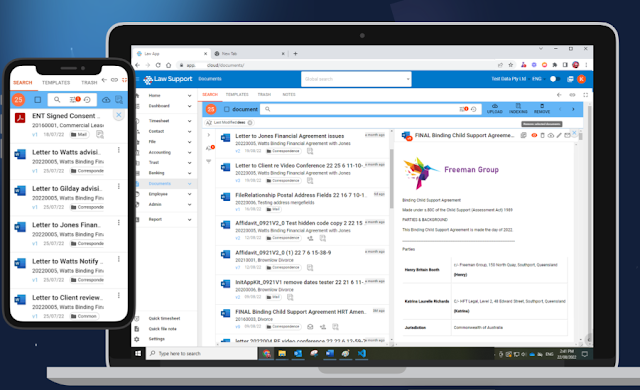How Can Law Office Document Management Software Help Your Business?
In today's fast-paced legal landscape, law firms are inundated with an ever-increasing volume of documents and data. From contracts and legal briefs to client correspondence and court records, the sheer volume of paperwork can be overwhelming. In such an environment, the efficient management of documents is crucial not only for maintaining compliance and ensuring accuracy but also for enhancing productivity and client service. This is where Law Office Document Management Software comes into play.
Law Office Document Management Software is a specialized solution designed to streamline the document management processes within law firms. It offers a wide array of features and tools to help legal professionals efficiently create, organize, store, and retrieve documents. In this article, we will explore how this software can significantly benefit your law office and why it has become an indispensable tool in the modern legal practice.
The Challenge of Document Management in Law Firms
Law firms, regardless of their size, deal with a vast array of documents daily. These documents include legal pleadings, contracts, research materials, email correspondence, client records, and more. The complexity of managing these documents intensifies due to the following challenges:
1. Volume: Law firms generate and receive an enormous volume of documents daily, making it challenging to keep track of them.
2. Security and Confidentiality: Legal documents often contain sensitive and confidential information, and maintaining their security is paramount.
3. Collaboration: Lawyers and support staff often need to collaborate on documents, which can be challenging without a centralized system.
4. Version Control: Keeping track of document versions is crucial to prevent errors or inconsistencies in legal proceedings.
5. Regulatory Compliance: Law firms must adhere to various regulations regarding document retention, which can be complex and time-consuming to manage manually.
Law Office Document Management Software addresses these challenges head-on, providing solutions that help law firms overcome these obstacles and operate more efficiently.
Benefits of Law Office Document Management Software
1. Efficient Document Creation and Organization:
Law Office Document Management Software offers tools for creating, editing, and formatting legal documents. Templates and document assembly features can significantly speed up the process of drafting contracts, pleadings, and other legal documents. This efficiency helps lawyers save time and reduce the risk of errors.
Additionally, these software solutions provide robust organizational features. Documents can be tagged, categorized, and indexed for easy retrieval. This means that lawyers and support staff can quickly find the documents they need, even in the midst of a hectic case or transaction.
2. Enhanced Collaboration:
Collaboration is essential in a law firm, and document management software simplifies this process. Multiple team members can work on the same document simultaneously, and changes are tracked, allowing for version control. Comments and annotations can be added, facilitating communication among team members.
Moreover, cloud-based document management software enables remote collaboration, making it easier for lawyers to work together regardless of their physical location. This is especially valuable in today's era of remote and hybrid work arrangements.
3. Security and Confidentiality:
Law firms handle sensitive and confidential information daily, and data breaches can have severe consequences. Document management software offers robust security features such as encryption, access controls, and audit trails to safeguard sensitive documents. This ensures that only authorized personnel can access confidential client information, maintaining the trust of clients.
4. Streamlined Workflow:
Law firms can streamline their workflow by automating routine document-related tasks. For example, document management software can automatically route documents for review and approval, reducing the need for manual intervention. This not only saves time but also reduces the likelihood of errors.
5. Compliance and Retention Management:
Document management software helps law firms adhere to regulatory requirements for document retention and disposal. These solutions often come with built-in retention policies that can automatically archive or delete documents based on predefined criteria. This ensures that the firm remains compliant with legal obligations while reducing the risk of data hoarding.
6. Improved Client Service:
Enhanced document management translates into better client service. Lawyers can access client records and documents quickly, answer client inquiries promptly, and provide more accurate and up-to-date information. This not only enhances client satisfaction but also boosts the firm's reputation.
7. Cost Savings:
Implementing document management software can lead to significant cost savings. By reducing the need for physical storage space and decreasing the time spent on manual document management tasks, law firms can optimize their operations and allocate resources more efficiently.
Conclusion
In the fast-paced and highly competitive world of law, efficient document management is crucial for the success of a law firm. Law Office Document Management Software has emerged as an indispensable tool for modern legal practices, helping them overcome the challenges of managing vast volumes of documents while enhancing productivity, security, and compliance.
From efficient document creation and organization to enhanced collaboration and security, these software solutions offer a wide range of benefits. They streamline workflow processes, ensure regulatory compliance, and ultimately improve client service, all while saving time and reducing costs.


Comments
Post a Comment